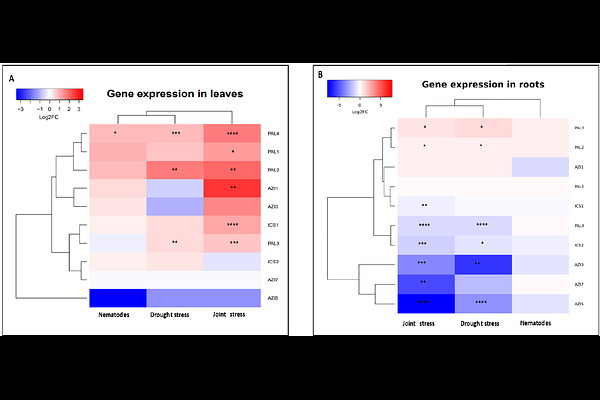Drought stress modulates the molecular response of Arabidopsis plants to root-knot nematode infection

Drought stress modulates the molecular response of Arabidopsis plants to root-knot nematode infection
Refaiy, A.; Lilley, C. J.; Atkinson, N. J.; Urwin, P. E.
AbstractPlants are exposed to multiple concurrent stresses under field conditions that can include a combination of biotic and abiotic factors. Drought stress and plant parasitic nematodes are among the most damaging stress factors limiting plant growth and production. Plants have developed complex and specific responses to combined biotic and abiotic stresses, which differ from their responses to individual stresses. Therefore, there is an imperative need to understand plant responses to multiple stresses as a central avenue for development of robust plants with the ability to sustain growth and crop production in times of global climate change. RNA-Seq analysis was performed on Arabidopsis plants to investigate the transcriptomic responses to infection with the root-knot nematode Meloidogyne incognita and drought stress either individually or concurrently. Arabidopsis plants activated a unique suite of genes in response to the joint stress, which significantly differed from the response to either individual stress. Among these differentially expressed genes, Azelaic Acid Induced 1 (AZI1), small auxin upregulated RNA 71 (SAUR71), and Disease Related Nonspecific Lipid Transfer Protein 1 (DRN1) may play important roles in plant responses to concurrent drought stress and root-knot nematode infection. The expression of AZI1, which is involved in priming defences via systemic acquired resistance, was uniquely upregulated in Arabidopsis leaves in response to the combined stress. SAUR71, which is a member of the largest family of primary auxin response genes, was induced solely in response to combined stress. In contrast, the expression of DRN1, a member of the non-specific lipid-transfer protein family, was strongly suppressed in Arabidopsis roots by combined drought stress and nematode infection.